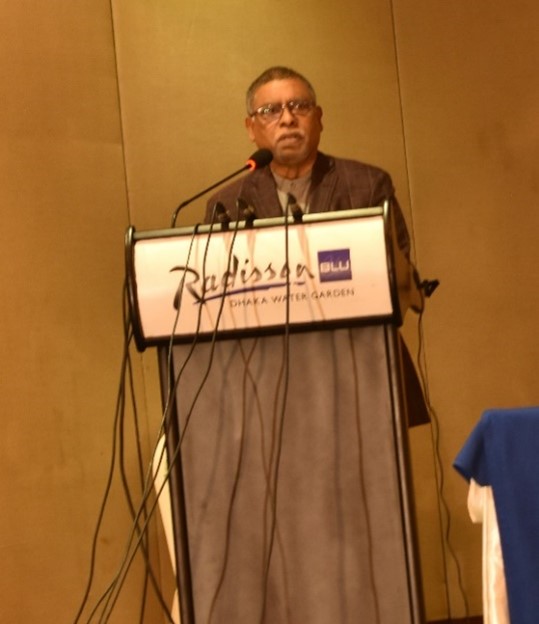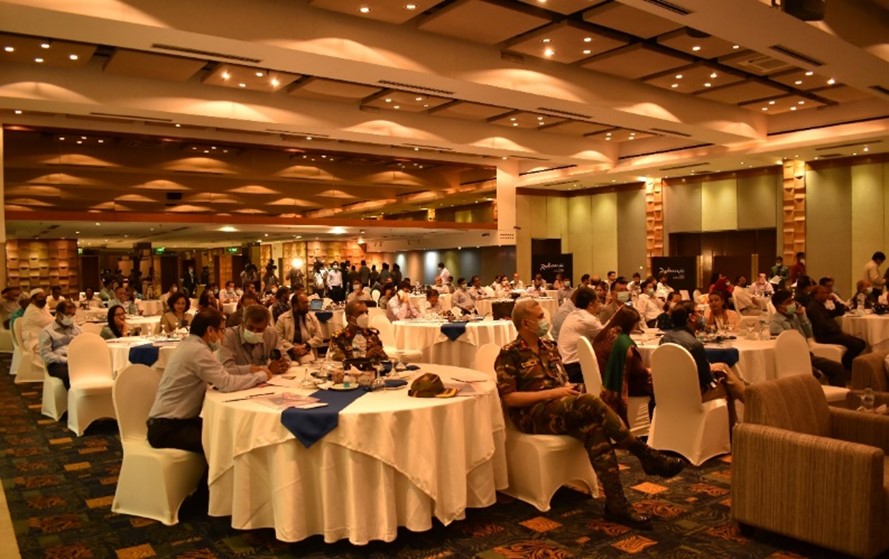The National Malaria Elimination Program, Bangladesh conducted the 5th Joint Monitoring Mission (JMM) from 24th of July to 10th of August 2022 in Hotel Radisson Blue. The aim of this JMM was to review the implementation of the National Strategic Plan 2021 – 25 and provide recommendations. National and International experts, partners such as BRAC, PWC and GFATM, Members of the Civil Society, and all three levels of WHO actively participated in this review. From the WHO Country Office the Communicable Disease Surveillance Unit led this effort and supported the government through their technical expertise. The WHE and Health Systems units also participated in the JMM, which was conducted through the lens of Strengthening the Health Systems and Primary Health Care for achieving Universal Health Coverage for Malarial services.
The dissemination of the JMM findings were presented to policymakers, partners, and various ministries on the 10th of August 2022. This meeting was graced by the presence of the Honorable Health Minister of Bangladesh, Mr. Zahid Maleque. Dr Bardan Jung Rana, WHO Representative to Bangladesh, graced the occasion as a special guest. Other dignitaries on the dais included Prof. Dr. Abul Bashar Mohammad Khurshid Alam, Director General of Health Services, DGHS, Professor Ahmedul Kabir, Additional Director General of Health Services, DGHS, and Professor Md. Nazmul Islam, Director, Disease Control & Line Director, CDC, DGHS.
Several high-profile government officials from the Ministry of Health and Family Welfare (MOHFW), Director General Health Services (DGHS), and other national and international development partners attended the meeting. The meeting started with the JMM findings and recommendations presented by Professor Dr. T. Sundararaman, an International Independent Consultant and Team Lead for this JMM.
 Photo credit: WHO/Salma Sultana
Photo credit: WHO/Salma Sultana
WHO Representative to Bangladesh Dr. Bardan Jung Rana, in his address said that the present JMM was different from the previous four because the issues of Malaria last mile have been emphasized in the present one. In early JMM, Malaria non-endemic 51 districts were not in the plan for review but in the present one it exists. In this JMM, the MEAT Audit (Malaria Elimination Audit Tool) has been conducted as a part of the pre-JMM assessment. Dr. Bardan Jung Rana expressed his hope by saying, “ we expect the experts in this program review have dug deep to extract key information that would help us understand why the malaria situation in Bandarban remains high.” He also praised the dedication of International Independent Consultants, other National experts, WHO staffs from the Country Office, Regional Office and HQ, and Global Fund for making this JMM successful. He added, “we need to keep working together to reach the goal by 2030. Together, we can eliminate Malaria.”

Photo credit: WHO/Salma Sultana
Prof. Dr. Abul Bashar Mohammad Khurshid Alam, Director General of Health Services, DGHS, mentioned that “under the strong leadership of our honourable Minister, Ministry of Health and Family Welfare, we could control Covid 19 very successfully along with other diseases and health-related problems including malaria in the country.”
Mr. Zahid Maleque, MP, Honorable Minister, MOHF&W, said, “I strongly believe by implementing the recommendations just presented, the national elimination program will be able to achieve the target of malaria elimination by 2030”. The Minister added, “we strongly believe we will be able to eliminate malaria from Bangladesh by 2030 or earlier. For this, all related government and non-government sectors, including civil society, must actively support achieving malaria elimination. The government of the People’s Republic of Bangladesh has already increased the domestic funding for malaria and other diseases. I would like to request donors, specifically the Global Fund and technical organizations like WHO, to continue their support to eliminate malaria in the targeted time frame. I know this is a difficult task but achievable if we can work together.”

Photo credit: WHO/Salma Sultana
For more information on the issues covered in this web story, please contact ssultana@who.int
